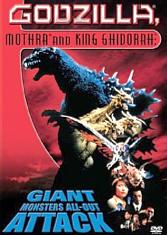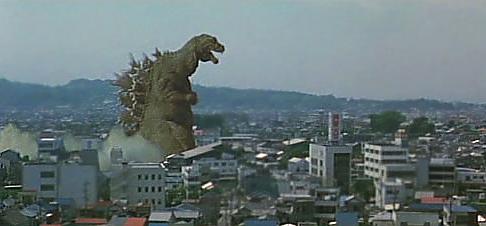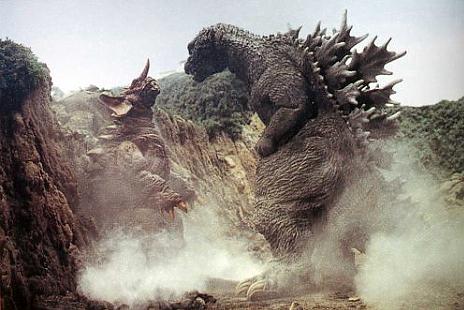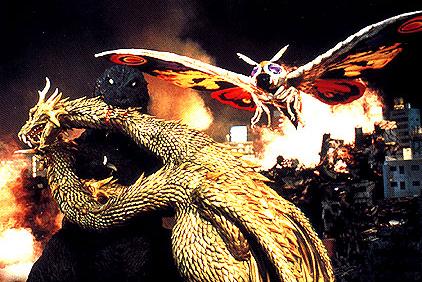gmk
 |
Again showing that it is indeed possible to take giant monster films seriously, from Toho Studios in Japan and the director of Gamera 3 comes Godzilla • Mothra • King Ghidorah: Giant Monsters All-Out Attack (often abbreviated by fans as simply GMK for short, and boy does it need it). Directed by Shusuke Kaneko with Special Effects by Makoto Kamiya (moving up from being a special effects assistant on Gamera 3 as well as the previous two films in that trilogy) and featuring a unique synth-heavy score by Ko Otani (the Gamera trilogy again), GMK attempts to return Godzilla to his villainous roots, presenting the King of the Monsters in a way he hasn't been seen in since the franchise first began (with a touch of the supernatural thrown in to spice things up).

 |
Set as a direct sequel to the original 1954 Gojira (edited and released in the United States in 1956 as Godzilla, King of the Monsters, featuring new footage with Raymond Burr) and ignoring every other film to come after the first, GMK celebrates Godzilla's 50th birthday by setting the story in the year 2004 where a malicious Godzilla (complete with soulless, white eyes) reappears to remind an ignorant Japan of the horrors of the Pacific World War (a timely subject for this 2001 production, with Japan being accused of downplaying their involvement in World War II more and more with every passing year). However, the country has three ancient defenders, Baragon, Mothra, and King Ghidorah, to protect it whenever the need should arise. Although not necessarily fighting on the side of humanity, the three Sacred Guardian Beasts challenge the King of the Monsters head-on in an all-out battle royale, showcasing some of the best special effects to ever grace any Japanese Godzilla film within the monster's 50 year history.
 |
After the last Godzilla film (the surprisingly disappointing Godzilla vs. Megaguirus) completely bombed at the Japanese box office, out of an act of desperation to save the series from going on another long hiatus, Toho decided to take a chance and hired the director of the critically acclaimed Gamera trilogy to reinvigorate the franchise and, for the most part, he more than delivers. Originally meant to feature the underutilized monsters Baragon, Varan, and Anguirus as the three Sacred Guardian Beasts (all three are very similar in style and have very little in the way of backstory, making them perfect candidates for a complete reworking), Kaneko was forced by Toho to replace Varan and Anguirus and shoehorn the more popular Mothra and King Ghidorah into the story instead. Although many fans will understandably have reservations over the revised history of the four monsters which populate the film (especially King Ghidorah, who is usually a villain), GMK will undoubtedly go down as one of the better installments in this long running film series, which continues today thanks to this film's box office success.
 |
With the renewed interest in the Monster King because of his 50th anniversary, Godzilla • Mothra • King Ghidorah: Giant Monsters All-Out Attack is now available in the U.S. and Canada on DVD through Sony's Tristar Pictures label as Godzilla, Mothra, and King Ghidorah: Giant Monsters All-Out Attack (try DVD Price Search for the best price), with next-to-no special features whatsoever other than a handful of unrelated extra trailers (the only ones worth mentioning being the sci-fi spectacle Returner, starring the reclusive Takeshi Kaneshiro, and the Charlie's Angels inspired So Close, starring three really hot Asian chicks, who are always fun to watch). Although the lack of extras is disappointing (the Japanese Region 2 release from Toho is THREE WHOLE DISCS of giant monster goodness), Sony did see fit to include both the "international" English dub produced for the film by Toho, as well as the original unaltered Japanese dialogue with English subtitles. The dub, badly translated by the Hong Kong company that Toho usually farms this work out to, features quite possibly the worst voice acting ever done for any Godzilla film to date. To make matters worse, the subtitles, in an unfortunate act of laziness on Sony's part, basically transcribe the horribly translated English dub (in many scenes the subtitles are actually the COMPLETE OPPOSITE of what is actually being said), but it is the lesser of the two evils. For the most part, they get the job done.
re: @
 |
 |
 |